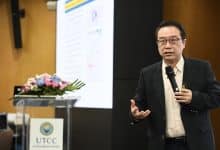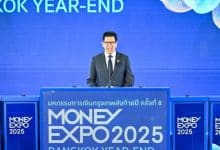Thailand hikes interest rate amid economic uncertainty, shifts focus to soft power

The Bank of Thailand unexpectedly hiked its interest rate to a decade-high of 2.5% in an effort to combat inflation and prepare for global economic fluctuations. This move has cast uncertainty over the nation’s economic outlook.
The government has set an ambitious GDP target of 4.4% for the following year, a significant increase from this year’s projection of 2.5-3.0%.
Despite the reliance on the tourism industry to revive the economy amidst sluggish exports, experts argue that this is not a sustainable solution without appropriate strategies to bolster the long-term competitiveness of other sectors.
The Cabinet has approved a policy to support the creative economy by establishing a national soft power strategy committee, led by Prime Minister Srettha Thavisin. The committee comprises representatives from ten ministries and prominent business leaders from various sectors.
However, the private sector remains sceptical about the effectiveness of policies such as One Family, and One Soft Power in making soft power a robust economic tool rather than just a buzzword.
Analysts are keen to see how this new committee distinguishes itself from the previous government’s soft power committee, which achieved little.
One Family, One Soft Power
Visit Limlurcha, president of the Thai Future Food Trade Association, considers the One Family, One Soft Power policy feasible, yet it necessitates concerted efforts to empower communities with the necessary knowledge to create community-based products and services.
Visit advocates for a special focus on tourism, suggesting a push for high-potential tourism and health tourism to attract affluent visitors. He also suggests the establishment of a fund for operators and risk assurance for times of crisis.
In addition, Tanit Choomsang, president of the Chiang Mai Restaurant and Bistro Association, stresses the need for a soft power strategy to train chefs at the beginner levels to meet the growing demand of tourists and locals.
Tanit supports the One Family, One Soft Power strategy to develop 20 million skilled creative workers to enhance Thailand’s competitiveness.
Meanwhile, Kriengkrai Thiennukul, chairman of the Federation of Thai Industries (FTI), argues that the development of creative industries is not solely a government task. Both state agencies and businesses need to cooperate and set clear goals.
Thai food is globally acclaimed and manufacturers can use this reputation to produce and export Thai food products, adding value to farm produce supplied to factories, he added.
Low-interest loans
Visit also agrees with Tanit that the government should provide additional funding to restaurants, suggesting offering low-interest loans while removing trade barriers. He urged the government to address labour shortages in the industrial sector and increase spending in knowledge-based industries to stimulate future investments.
Thanavath Phonvichai, president of the University of the Thai Chamber of Commerce, suggests the government should use tax measures to support startups to create soft power.
He suggested following the example of countries like South Korea where the government has a clear policy to promote the country’s soft power, both in the form of subsidies and tax incentives.
He argued that Thailand has a strong foundation for exporting soft power because anything that ends with the word Thai is internationally acclaimed, such as Thai massage, Pad Thai and Thai cuisine, Bangkok Post reported.
Latest Thailand News
Follow The Thaiger on Google News:


























